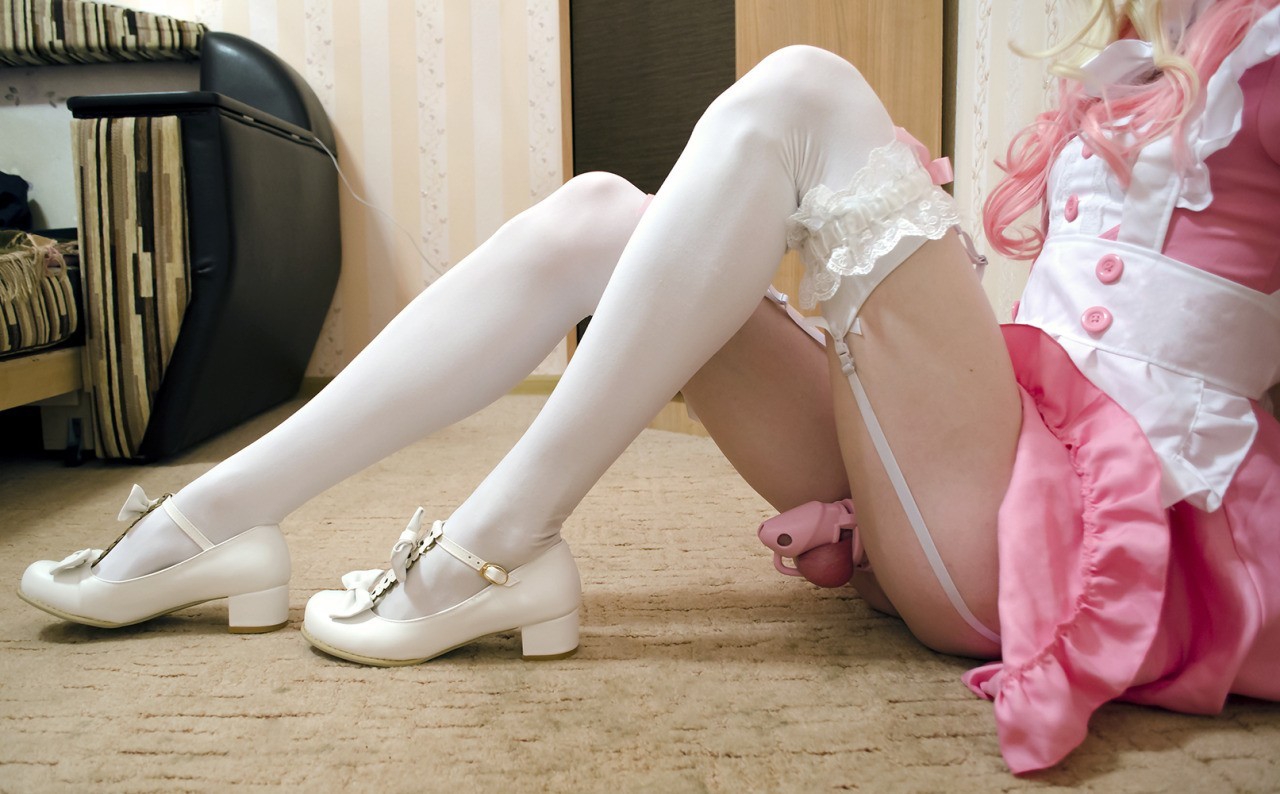Hubby indulges my love of open toe shoes, mules, sandals and slippers. Winter or summer, my toes are out.
Monday, 31 July 2023
Mood
I'm very happy to be back in my device this week. I feel more comfortable without hubby when I'm caged. His love, power and influence extends to me in chastity. I feel bounded to him and 100% submissive.
Saturday, 29 July 2023
Friday, 28 July 2023
Tuesday, 25 July 2023
Being a sissy means you’re not a traditional Western culture "male," in that way that ascribes traditional masculine qualities to people born with a penis: Physical strength, relative lack of emotional depth, the whole hunter / gatherer / protector metaphor. It’s all nothing I ever wanted anyway. Without going into too much sociopolitical detail, I feel in my heart that this sort of “male energy” is what has caused the world so much pain and grief.
Being a sissy also doesn’t mean you’re a woman, at least not in the usual sense. I, for example, do not have female genitals, and currently don’t plan to. I don’t rule out that I may wish to transition sometime in the future, but at that point, I would become a woman, no longer a sissy. Sissies like me certainly present as female, but again, we’re talking about this in terms of traditional cultural mores: Mode of dress, choice of how and where to display hair, and what length to wear it on one’s head, deportment, voice, etc. Again, when “female” is recognized as deferential, passive, soft (The opposite of traditional male characteristics), we can again recognize that this part is simply cultural, not biological. There is no imperative in nature that there should be two distinctly separated genders, both of whom are only privy to certain qualities that define a human being.
What I find so essential, celebratory and let’s-throw-a-parade-gay about him is his ability to love whatever is aesthetically pleasurable that he comes across. Take a look at his poem, “Today,” included, along with the other poems in this essay, in the 2008 collection Selected Poems:Oh! Kangaroos, sequins, chocolate sodas!You really are beautiful! Pearls,Harmonicas, jujubes, aspirins! AllThe stuff they’ve always talked aboutStill makes a poem a surprise!These things are with us every dayEven on beachheads and biers. TheyDo have meaning. They’re strong as rocksHis work is filled with unexpected tastes and nearly absent of any sort of hierarchy. Kangaroos? Lovely. Long terrible b-films? Satisfying. Rachmaninoff? Sublime. Drinking coke with a cute guy? The best. O’Hara presides over a democracy of affection.And have you ever seen so many exclamation points from a grown man? It’s like listening to a kindergarten teacher! He’s just so enthusiastic that he can’t help but cram the poem with one jubilant thing after another. This is ecstasy, like the build up to an orgasm frothed into mania. But the sequins, sodas, and jujubes are also solid—“They’re strong as rocks.” These are foundations for our lives.Critics have called this aspect of O’Hara’s sensibility camp, hit the print button, and called it a day. But that’s not quite what’s at work here. When I think of camp within the gay community—say, reenacting scenes from Mommy Dearest or a certain love of Cher riding a Navy cannon in black fishnets and a sneer—there’s an element of performance in the opinion: it feels like a socially learned behavior rather than an incidental personal taste. If you look at Halperin’s How to be Gay, it’s clear that some scholars believe that mainstream entertainments, for example—the book cites Mildred Pierce—are passed among members of the gay community as primers, or instructive texts on how to behave (and in Halperin’s class at University of Michigan, they are). It’s not so much innate that we love Mildred Pierce as something we learn, which is to say it may be separate from what we actually like. Camp also gives us a protective barrier of irony from our pleasure in lowbrow likes. The irony distances us, and says “Hey, I know this is terrible. But it’s also fun!”O’Hara collapses that ironic distance and it’s all sincerity. He’s so sincere, that as much as I admire him (and I really admire him!), I’d feel embarrassed to have written some of his poems. Not because it’s shameful, but because it’s just too, *too* much. But he means it.And this is where camp becomes a problem. Camp, at its heart, is about taste. And taste, as we know, is a sort of fingerprint of thought—and of attraction. Critics evaluating O’Hara, as Marjorie Perloff pointed out in her excellent study Frank O’Hara: Poet Among Painters, labeled his work as “late Victorian camp” or “streamers of crepe paper fluttering before an electric fan” or “mental chatter and drift.” Invariably, these feel like codes to the knowing reader, that his work was just plain *gay*.Camp is often a derogatory term. We like it, but we feel like we shouldn’t. Just as the foodie loathes his enjoyment of Chicken McNuggets, we can’t just say we like something, but rather we can have the barrier of camp to say, “I love this and I know it’s awful.” There’s shame in the attraction, just as when we were young gaylings the world around us often reinforced that our feelings are shameful.O’Hara’s poems are an antidote to this feeling of shame over the tastes we find natural and immovable. James Schuyler, perhaps the most sublime poet of the small thing made infinite, in one of his many catty, bright, loving letters to his dear friend O’Hara put it best:Your passion always makes me feel like a cloud the wind detaches (at last) from a mountain so I can finally go sailing over all those valleys with their crazy farms and towns. I always start bouncing up and down in my chair when I read a poem of yours like “Radio,” where you seem to say, “I know you won’t think this is much of a subject for a poem but I just can’t help it: I feel like this,” so that in the end you seem to be the only one who knows what the subject of a poem is.The pleasures of a poem like “Radio,” good enough to make Schuyler ride his chair, come primarily from our empathy with O’Hara since we all know how awful it is to want some small satisfaction after a week of drudgery—the radio plays nothing but rubbish when all we want to hear is something great—and the comic distance between O’Hara’s invocation of the grand emotions and subjects of poetry (longing for “immortal energy” when one is “mortally tired”) when, in fact, it’s a fifteen line poem where Frank is bitching at his radio for playing such crap.But these small things are everything. It’s true that we feel just as strongly, however irrational it may be, about the minute pleasures of our lives as we do about the supposedly great things. Our emotional responses don’t always differentiate between the two even if our minds tell us that we should. One look at a Black Friday stampede at Target shows us this, and O’Hara says as much in “Today.”What I think I learn from his poetry—if anything as auspicious as learning happens from contact with verse—is how to like. What we prefer, what we enjoy, and what we desire are as singular as a fingerprint and in O’Hara’s work having a coke with the man he loves is as sublime as a masterpiece by Leonardo or Michaelangelo.I don’t think there’s a love poem that means more to me—and notice here that I don’t make any claims as to whether or not it’s the love poem that should mean the most to you—than O’Hara’s love poem for Vincent Warren “Having a Coke With You.”The pleasure he takes in sharing a soda with Warren is arbitrary, intuitive, and surprising:HAVING A COKE WITH YOUis even more fun that going to San Sebastian, Irún, Hendaye, Biarritz, Bayonneor being sick to my stomach on the Traversera de Gracia in Barcelonapartly because in your orange shirt you look like a better happier St. Sebastianpartly because of my love for you, partly because of your love for yoghurtpartly because of the fluorescent orange tulips around the birchespartly because of the secrecy our smiles take on before people and statuaryOf course it’s going to be better than being sick to his stomach in Barcelona, but what has love of yogurt or orange tulips go to do with it? (Sure, they match the color of Warren’s charming shirt, but they are a part of the landscape and not even something the object of O’Hara’s love is responsible for). It’d be like telling my boyfriend that I fell in love with him because of the mural at the bar we met at. But, come to think of it, why not? And look how long the lines get, as though the form of the poem itself can barely contain what Frank is feeling, and there’s so much he’d like to say that it strains to be held between the two edges of the page. Eventually, this conversational, upfront tone isn’t enough and he reaches for an actual metaphor, something surreal. O’Hara needs a new sort of language, something absent in his everyday experience, to capture what happens between his body and Vincent’s:it is hard to believe when I’m with you that there can be anything as stillas solemn as unpleasantly definitive as statuary when right in front of itin the warm New York 4 o’clock light we are drifting back and forthbetween each other like a tree breathing through its spectacles.[...]...these are poems of immediacy, poems of taking the world as it exists, in that moment. It feels like the past and future falls away and all that remains is now. When O’Hara thinks he’s wrong, he corrects himself: “I am ill today but I am not / too ill. I am not ill at all.” He’s agile, and like a jazz musician he’s not so much playing the music as playing the changes. In “My Heart,” he declares, “I want to be / at least as alive as the vulgar.”What I love about O’Hara is the way that he is camp, because it’s not too camp. It is not camp at all. What his poems declare, to quote his friend Schuyler, is “I just can’t help it, I feel like this.” Certainly other poets have expressed this democracy of taste, this unbridled attraction before him—particularly Whitman, in his own nineteenth-century queer way. As O’Hara once commented to his roommate and sometimes lover, Joe Lesueur, homosexuality wasn’t just about sex, it was about his love of the freedoms that went with it...Our lives won’t be all kangaroos and blond ballet dancers. And difference can be painful, it can be felt like a disfigurement, and it’s easy to envy, at times, the ease of life for people in the majority. As O’Hara laments “you were made in the image of god / I was not / I was made in the image of a sissy truck-driver.” But there’s joy in loving what you love, a purity in expressing it exactly in its unchecked, effusive and messy truth, and O’Hara felt no shame in putting that feeling out there with an exclamation!
What I find so essential, celebratory and let’s-throw-a-parade-gay about him is his ability to love whatever is aesthetically pleasurable that he comes across. Take a look at his poem, “Today,” included, along with the other poems in this essay, in the 2008 collection Selected Poems:
Oh! Kangaroos, sequins, chocolate sodas!
You really are beautiful! Pearls,
Harmonicas, jujubes, aspirins! All
The stuff they’ve always talked about
Still makes a poem a surprise!
These things are with us every day
Even on beachheads and biers. They
Do have meaning. They’re strong as rocks
His work is filled with unexpected tastes and nearly absent of any sort of hierarchy. Kangaroos? Lovely. Long terrible b-films? Satisfying. Rachmaninoff? Sublime. Drinking coke with a cute guy? The best. O’Hara presides over a democracy of affection.
And have you ever seen so many exclamation points from a grown man? It’s like listening to a kindergarten teacher! He’s just so enthusiastic that he can’t help but cram the poem with one jubilant thing after another. This is ecstasy, like the build up to an orgasm frothed into mania. But the sequins, sodas, and jujubes are also solid—“They’re strong as rocks.” These are foundations for our lives.
Critics have called this aspect of O’Hara’s sensibility camp, hit the print button, and called it a day. But that’s not quite what’s at work here. When I think of camp within the gay community—say, reenacting scenes from Mommy Dearest or a certain love of Cher riding a Navy cannon in black fishnets and a sneer—there’s an element of performance in the opinion: it feels like a socially learned behavior rather than an incidental personal taste. If you look at Halperin’s How to be Gay, it’s clear that some scholars believe that mainstream entertainments, for example—the book cites Mildred Pierce—are passed among members of the gay community as primers, or instructive texts on how to behave (and in Halperin’s class at University of Michigan, they are). It’s not so much innate that we love Mildred Pierce as something we learn, which is to say it may be separate from what we actually like. Camp also gives us a protective barrier of irony from our pleasure in lowbrow likes. The irony distances us, and says “Hey, I know this is terrible. But it’s also fun!”
O’Hara collapses that ironic distance and it’s all sincerity. He’s so sincere, that as much as I admire him (and I really admire him!), I’d feel embarrassed to have written some of his poems. Not because it’s shameful, but because it’s just too, *too* much. But he means it.
And this is where camp becomes a problem. Camp, at its heart, is about taste. And taste, as we know, is a sort of fingerprint of thought—and of attraction. Critics evaluating O’Hara, as Marjorie Perloff pointed out in her excellent study Frank O’Hara: Poet Among Painters, labeled his work as “late Victorian camp” or “streamers of crepe paper fluttering before an electric fan” or “mental chatter and drift.” Invariably, these feel like codes to the knowing reader, that his work was just plain *gay*.
Camp is often a derogatory term. We like it, but we feel like we shouldn’t. Just as the foodie loathes his enjoyment of Chicken McNuggets, we can’t just say we like something, but rather we can have the barrier of camp to say, “I love this and I know it’s awful.” There’s shame in the attraction, just as when we were young gaylings the world around us often reinforced that our feelings are shameful.
O’Hara’s poems are an antidote to this feeling of shame over the tastes we find natural and immovable. James Schuyler, perhaps the most sublime poet of the small thing made infinite, in one of his many catty, bright, loving letters to his dear friend O’Hara put it best:
Your passion always makes me feel like a cloud the wind detaches (at last) from a mountain so I can finally go sailing over all those valleys with their crazy farms and towns. I always start bouncing up and down in my chair when I read a poem of yours like “Radio,” where you seem to say, “I know you won’t think this is much of a subject for a poem but I just can’t help it: I feel like this,” so that in the end you seem to be the only one who knows what the subject of a poem is.
The pleasures of a poem like “Radio,” good enough to make Schuyler ride his chair, come primarily from our empathy with O’Hara since we all know how awful it is to want some small satisfaction after a week of drudgery—the radio plays nothing but rubbish when all we want to hear is something great—and the comic distance between O’Hara’s invocation of the grand emotions and subjects of poetry (longing for “immortal energy” when one is “mortally tired”) when, in fact, it’s a fifteen line poem where Frank is bitching at his radio for playing such crap.
But these small things are everything. It’s true that we feel just as strongly, however irrational it may be, about the minute pleasures of our lives as we do about the supposedly great things. Our emotional responses don’t always differentiate between the two even if our minds tell us that we should. One look at a Black Friday stampede at Target shows us this, and O’Hara says as much in “Today.”
What I think I learn from his poetry—if anything as auspicious as learning happens from contact with verse—is how to like. What we prefer, what we enjoy, and what we desire are as singular as a fingerprint and in O’Hara’s work having a coke with the man he loves is as sublime as a masterpiece by Leonardo or Michaelangelo.
I don’t think there’s a love poem that means more to me—and notice here that I don’t make any claims as to whether or not it’s the love poem that should mean the most to you—than O’Hara’s love poem for Vincent Warren “Having a Coke With You.”
The pleasure he takes in sharing a soda with Warren is arbitrary, intuitive, and surprising:
HAVING A COKE WITH YOU
is even more fun that going to San Sebastian, Irún, Hendaye, Biarritz, Bayonne
or being sick to my stomach on the Traversera de Gracia in Barcelona
partly because in your orange shirt you look like a better happier St. Sebastian
partly because of my love for you, partly because of your love for yoghurt
partly because of the fluorescent orange tulips around the birches
partly because of the secrecy our smiles take on before people and statuary
Of course it’s going to be better than being sick to his stomach in Barcelona, but what has love of yogurt or orange tulips go to do with it? (Sure, they match the color of Warren’s charming shirt, but they are a part of the landscape and not even something the object of O’Hara’s love is responsible for). It’d be like telling my boyfriend that I fell in love with him because of the mural at the bar we met at. But, come to think of it, why not? And look how long the lines get, as though the form of the poem itself can barely contain what Frank is feeling, and there’s so much he’d like to say that it strains to be held between the two edges of the page. Eventually, this conversational, upfront tone isn’t enough and he reaches for an actual metaphor, something surreal. O’Hara needs a new sort of language, something absent in his everyday experience, to capture what happens between his body and Vincent’s:
it is hard to believe when I’m with you that there can be anything as still
as solemn as unpleasantly definitive as statuary when right in front of it
in the warm New York 4 o’clock light we are drifting back and forth
between each other like a tree breathing through its spectacles.
[...]
...these are poems of immediacy, poems of taking the world as it exists, in that moment. It feels like the past and future falls away and all that remains is now. When O’Hara thinks he’s wrong, he corrects himself: “I am ill today but I am not / too ill. I am not ill at all.” He’s agile, and like a jazz musician he’s not so much playing the music as playing the changes. In “My Heart,” he declares, “I want to be / at least as alive as the vulgar.”
What I love about O’Hara is the way that he is camp, because it’s not too camp. It is not camp at all. What his poems declare, to quote his friend Schuyler, is “I just can’t help it, I feel like this.” Certainly other poets have expressed this democracy of taste, this unbridled attraction before him—particularly Whitman, in his own nineteenth-century queer way. As O’Hara once commented to his roommate and sometimes lover, Joe Lesueur, homosexuality wasn’t just about sex, it was about his love of the freedoms that went with it...
Our lives won’t be all kangaroos and blond ballet dancers. And difference can be painful, it can be felt like a disfigurement, and it’s easy to envy, at times, the ease of life for people in the majority. As O’Hara laments “you were made in the image of god / I was not / I was made in the image of a sissy truck-driver.” But there’s joy in loving what you love, a purity in expressing it exactly in its unchecked, effusive and messy truth, and O’Hara felt no shame in putting that feeling out there with an exclamation!
I once asked Alice Longworth just why her father was such a war-lover. She denied that he was. I quoted her father's dictum: "No triumph of peace is quite as great as the supreme triumph of war." A sentiment to be echoed by yet another sissy in the next generation: "Meglio un giorno da leone che cento anni da pecora." ["Better a lion's day than a hundred years of a sheep's life."] "Oh, well," she said, "that's the way they all sounded in those days." But they did not all sound that way. Certainly Theodore, Senior, would have been appalled, and I doubt if Eleanor really approved of Uncle Teddy's war-mongering.As president, TR spoke loudly and carried a fair-sized stick. When Columbia wouldn't give him the land that he needed for a canal, he helped invent Panama out of a piece of Columbia; and he got his canal. He also installed the United States as the policeman of the Western Hemisphere. In order to establish an American hegemony in the Pacific, TR presided over the tail-end of the slaughter of more than half a million Filipinos who had been under the illusion that after the Spanish-American War they would be free to set up an independent republic under the leadership of Emilio Aguinaldo. But TR had other plans for the Philippines. Nice Mr. Taft was made the governor-general and one thousand American teachers of English were sent to the islands to teach the natives the sovereign's language.Meanwhile, in the aftermath of the Boxer Rebellion, TR's "open-door policy" to China had its ups and downs. In 1905 the Chinese boycotted American goods because of American immigration policies, but the United States was still able to establish the sort of beachhead on the mainland of Asia that was bound to lead to what TR would have regarded as a bully fine war with Japan. Those of us who were involved in that war did not like it all that much.
The moment she realized it – a small lifetime had already happened. It wasn’t what she thought or had imagined, but it’s what was always expected to be. It was always the way it was supposed to be. It wasn’t a sense of loss or moment of astute clarity like she had thought. It was quiet, silent, and a passing moment. It is the type of moment she knows she will eventually tell her own child will happen to them, but it is the unknowing and drawn out nature of it that sticks with a person and still can make their heartache. It came from her living, loving, and moving on. When her world has changed and no longer aligns with her past life. It is the nostalgia and “what if” that made it the cycle of not wanting to let go. She didn’t feel upset or angry because those feelings had consumed her for so long. It was the plain normalcy of sitting on a bench and seeing how unalike the two souls were that did it for her. It wasn’t a specific second or thing that was said – it was her looking at it from the lenses that she deeply was trying to put on for years, but never had the heart to do. It took a couple hours to get over the decade of time gone by. And so it passed.
“I love borders. August is the border between summer and autumn; it is the most beautiful month I know. Twilight is the border between day and night, and the shore is the border between sea and land. The border is longing: when both have fallen in love but still haven't said anything. The border is to be on the way. It is the way that is the most important thing.”
maybe mediocrity isn’t wrong. maybe you don’t need to be the best at everything you do. maybe you don’t need to be the best at anything you do. it’s ok to simply do things because you enjoy doing them. its ok to not want to advance in your job. nothing has to be a competition. you don’t need to be better than anyone. you can do things just because they’re fun. you don’t need to read up on the history, and know everything about it. its ok to just exist. its ok.
The night gardener once asked me if I knew how citrus trees died: when they reach old age, if they are not cut down and they manage to survive drought, disease and innumerable attacks of pests, fungi and plagues, they succumb from overabundance. When they come to the end of their life cycle, they put out a final, massive crop of lemons. In their last spring their flowers bud and blossom in enormous bunches and fill the air with a smell so sweet that it stings your nostrils from two blocks away; then their fruits ripen all at once, whole limbs break off due to their excessive weight, and after a few weeks the ground is covered with rotting lemons. It is a strange sight, he said, to see such exuberance before death.
Subscribe to:
Comments (Atom)
-
This summary is not available. Please click here to view the post.
-
This summary is not available. Please click here to view the post.



















































